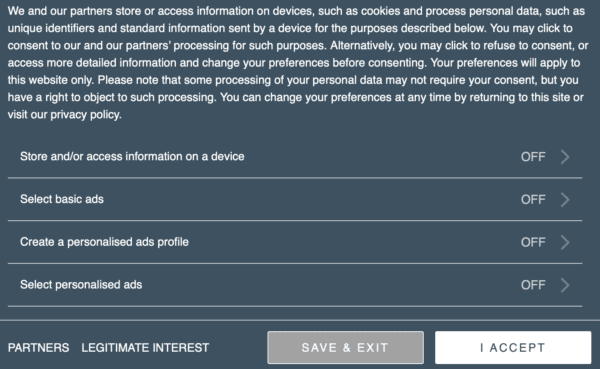Online security: The way the cookie crumbles

Ever wondered just how those eerily targeted ads end up on your browser? Not only is there a method, but there are millions behind the madness.
Computer cookies are slightly different to the chocolate chip filled treats in your kitchen. These are essentially packets of information that a webpage stores in your web browser (for example on Chrome or Safari).
These cookies can be useful. They keep you logged into your sites, keep track of what might be in your basket and autofill your passwords. There are many different types of cookies. For example, ‘session cookies’ are only working once you are on a site, however ‘persistent cookies’ can keep eyes on you, even when you close the webpage.
You will no doubt remember all the emails you got when the new GDPR (General Data Protection Regulation) guidelines came out in 2018. And you will have noticed how every webpage suddenly came up with a disclaimer about cookies. This was because the EU saw how citizens had no real control over the use of their data.
The worst part about this is that we don’t even know who has our data. Google are one of the only groups that have their own cookie trackers, so don’t be surprised when you see a lot of unfamiliar companies on your cookie list. Smaller webpages have to outsource this work and that’s where the big digital advertisers come in to make millions off your data.
‘Account-based marketing’, ‘digital advertisers’, ‘content analysers’ all mean the same thing. These companies operate on something called ‘third-party cookies’ (not very tasty).
Essentially, these track your interests and market you products from their clients. They see what you click on, how long you spend on certain screens and much more…
If you go on any of these companies websites, you will notice that they talk about your data in a very clinical and impersonal way. And what’s worse, these companies normally work with more than one site, meaning your data is potentially being shared between all their clients.
These companies are only getting smarter and are constantly trying to work around browsers that try to protect you. But there are ways to protect your data.
Check your settings
No matter which browser you use, you should be able to find your cookie information in the setting tab. Under ‘privacy and security’ you can actually turn off and delete third-party cookies for the browser. But Google have different settings for Gmail users. If you click ‘Manage your account’ and then ‘Data and Personalisation’ you can change your settings as well as delete your data.
It is not only browsers showing you personalised advertisements, social media apps such as Facebook and Instagram do too. If you’d like, you can turn off and limit these controls in their respective settings (normally at the end of a long list of options, you will find ‘ad preferences’).
Change your browser
If you don’t feel comfortable just deleting you cookies once from Chrome, browsers like Brave and Firefox have a level of privacy built-in. Either of these work well, but my personal recommendation would be Safari.
The newest version of Safari has some amazing features built-in that allow you to have more control over your data. Not only is it ridiculously easy to clear cookies, but you can also prevent cross-site tracking. You can also clearly see which companies are trying to track you on any given webpage and can keep all your passwords secure with their cross-platform password manager.
Take your time to opt-out

You will have noticed that these sites make it ridiculously easy to accept their cookies, with a bright green button glaring ‘Accept’. But, if you don’t want to accept, it can be a lot harder to say no. Normally you have to click something like ‘read more’ and then manually turn off all the cookies that you don’t want to see. And then choose between ‘save and exit’ (a grey button that will keep the setting you chose) and avoiding the ‘accept all and close’ option (a green button that will opt you in to all cookies). Opting out of cookies might take you 10 seconds longer than you would like, but it will help you control your data.
Visit youronlinechoices.com
This site was created to try to give the public control over their information. Under ‘your ad choices’ you can see a whole list of cookie companies that you have come into contact with. What’s even scarier for some, is that you can see which have been collecting your data and are responsible for those extremely targetted ads.
Now, what they have tried to do, is let you turn off companies that are collecting your data with a push of a button. This sounds great in theory, but these companies don’t want you to turn off their delicious cookies, so actually having a successful turn off can be quite hard. You can complain to the ASA for further help.
This article is not intended to scare you, but instead to help you become more aware of the control you have on your data. Take some time to set your own privacy controls, delete anyone you don’t want collecting your data and have a better time online.







